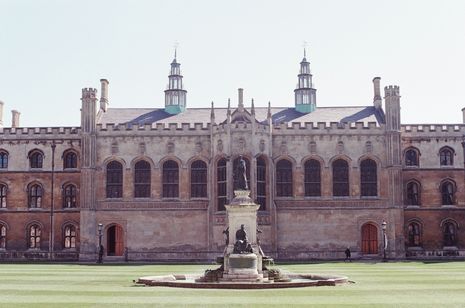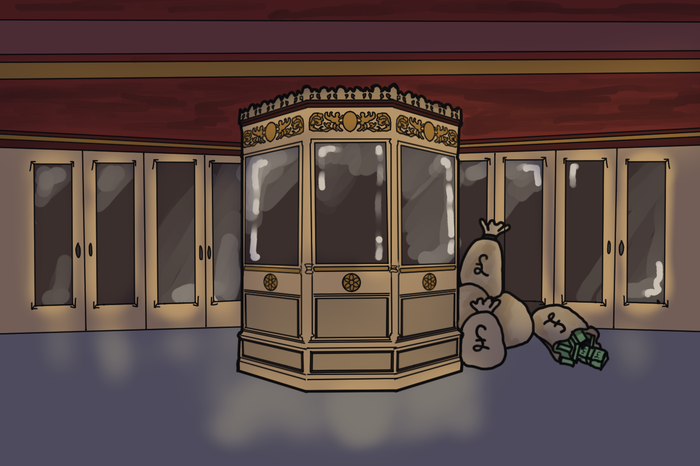Britain’s dying Oxbridge play: should we still be staging Bennett?
Katherine Stockton explores the problematic implications of Alan Bennett’s The History Boys

Content warning: this article contains discussion of paedophilia.
In 2022, AQA removed The History Boys from its GCSE set texts. Alan Bennett’s play depicts a group of academically excellent boys applying to read History at Oxford and Cambridge. Since it spends equal runtime espousing the wonders of reading as well as the wonders of student-teacher relationships, perhaps it’s time professional theatre followed AQA’s lead.
“England, you’ve been here too long…” recites schoolboy Timms to his teacher. The class is discussing decline: explicitly that of the British empire, implicitly that of education itself. The teachers in the audience are asked to wish all their students were just like Timms. Bennett treats his schoolboys’ ability to recite poetry as a relic of pre-Thatcherite Britain. Like maypole dancing, stamp collecting, worship — all gone. Learning has become notetaking and summarising, Bennett warns, and this will be the beginning of our end.
“Learning has become notetaking and summarising, Bennett warns, and this will be the beginning of our end”
Bennett persistently attempts to make his audience mourn recitation. The schoolboys charm with memorised screenplays, poems, and songs. It must be said that these moments do entertain: a favourite of mine is a group recitation of Larkin’s 'MCMXIV'. It’s an effective end stop to a dialectically forceful debate scene. A history-teacher-come-devil’s-advocate is momentarily silenced by poetry. Bennett’s point about the primacy of art is effectively made. But why does Bennett think recitation has vanished? And what else does he ask us to miss about our good old school days? Hector, a literature teacher nearing retirement, possesses an inexhaustible mental Rolodex of quotations and two wandering hands. The audience is not often asked to discern between the moral value of the two. The headmaster, upon discovering Hector’s transgressions, spits: “Fuck literature and Plato and Michaelangelo and Oscar Wilde and all the other shrunken violets you people line up. This is a school.”
“Hector’s predation is his undoing, but the play’s rebuke extends only to a raised eyebrow”
Hector defends himself: “the transmission of knowledge is in itself an erotic act.” Bennett may truly indulge in this fantasy: that teachers are erotic creatures, and pornography is knowledge, the verb “transmitted” most like an STD. Hector’s predation is his undoing, but the play’s rebuke extends only to a raised eyebrow. Scenes that follow attempt to redeem him: he comforts a gay student via Thomas Hardy; he sobs before his students. His ugly rawness, off-putting as it may be, is meant to be pitied. He dies, of course, and is mourned as a hero. Off he slides into history with the maypole dancers and the god worshippers and the stamp collectors.
“Pornography.” was the line Simon Rouse, playing Hector, swallowed during his final night’s performance of The History Boys at Richmond Theatre. Hector has heard Dakin will be studying History with Irwin instead of poetry with him. Dakin and Irwin, it is known amongst the school community, wish to get off with each other. Hector sighs: “Pornography.” I have a feeling I only heard this line as I was sat in the front row. It is cut from the 2006 film. Immediately after being fired, Hector continues to eroticise knowledge transfer. Rouse seemed to shy away from this side of Hector’s character.
“The production doesn’t want to lose its audience with scenes of eroticised paedophilia. But what remains is a production uncertain of itself”
This wasn’t the only moment of dissonance. Sean Linnen’s production seemed unsure whether it wanted to be staging the scenes at all. The climactic scene between Dakin and Irwin, where Dakin brashly offers himself; Irwin, thrillingly, almost accepts, traditionally plays as an exchange between two mutually attracted people. But in Linnen’s production, Irwin recoils, accepting a date simply to get Dakin to leave. Dakin has been touched by Hector and seduced by a secretary. Even Lintott, their female teacher, calls him “handsome.” Every adult seems to want Dakin. And Rouse’s Irwin, hunched and ashamed, sees this. The production doesn’t want to lose its audience with scenes of eroticised paedophilia. But what remains is a production uncertain of itself.
Perhaps the most chilling words belong to another schoolboy, Posner: “I’ve ended up like you, a teacher. I’m a bit of a stock figure… and though I never touch the boys, it’s always a struggle. Maybe that’s why I’m a good teacher.” Good teaching, Bennett suggests, is resisting inappropriate desire, that there’s nobility in the struggle.
In a 2013 Independent interview, Bennett said: “The boys are all consenting adults, and Hector’s behaviour is very unthreatening.” But the adults, or as he muddles within his own sentences, “boys,” have been at the hands of Hector for years, as the play maps out. Bennett’s language minimises abuse: “One often found one’s legs were touched up by old gentlemen, in a mild sort of way.”
“One often found” — as if it were a fly in your cereal. “But the notion that one would be scarred for life…” He trails off. Perhaps Bennett was unperturbed because the laying on of hands he experienced was the same “found” hand that wrote the lessons in chalk that got Bennett into Oxford.
Want to share your thoughts on this article? Send us a letter to letters@varsity.co.uk or by using this form.
 News / Judge Business School advisor resigns over Epstein and Andrew links18 February 2026
News / Judge Business School advisor resigns over Epstein and Andrew links18 February 2026 News / Gov grants £36m to Cambridge supercomputer17 February 2026
News / Gov grants £36m to Cambridge supercomputer17 February 2026 News / Union speakers condemn ‘hateful’ Katie Hopkins speech14 February 2026
News / Union speakers condemn ‘hateful’ Katie Hopkins speech14 February 2026 News / CUCA members attend Reform rally in London20 February 2026
News / CUCA members attend Reform rally in London20 February 2026 News / Right-wing billionaire Peter Thiel gives ‘antichrist’ lecture in Cambridge6 February 2026
News / Right-wing billionaire Peter Thiel gives ‘antichrist’ lecture in Cambridge6 February 2026










